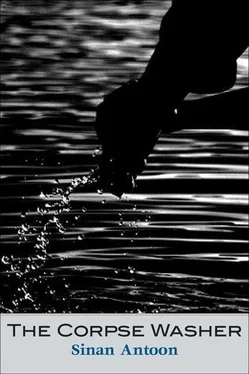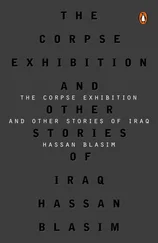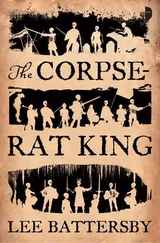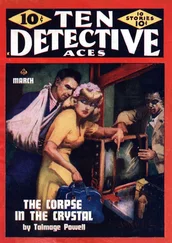Father’s relatives were not able to accompany the coffin. Tradition dictated that the dead must be buried as soon as possible. The war and the bombing made it difficult to inform his relatives since all the phones were dead. Even if they had been informed, the car trip on the road to Najaf was very risky — and provided an acceptable excuse that would save them from reproach. Only a mad person would want to be inside a moving car while bombers and fighter jets were hovering overhead, ready to spit fire at any moving object. Thus it was that the only people to accompany Father on his final journey were Hammoudy, who drove his brother’s car, Abu Layth, our neighbor and a longstanding friend of my father’s who insisted on coming, and myself.
We carried the coffin to the car, put it on the rack on top, and secured it with ropes. The trip to Najaf usually took two hours. Baghdad’s streets were empty that morning except for a few cars rushing to escape the city. Columns of black smoke billowed through the sky. I sat in the back. Nothing was said. The radio was crackling with patriotic songs and the news reported incessant bombings and battles around al-Basra and al-Nasiriyya. The Americans had reached the outskirts of Najaf, but the military spokesman stressed that our valiant soldiers and the heroes of the Fida’iyyin Saddam militias were inflicting heavy losses on the enemy and that “victory was surely ours in this final battle.” And that “the enemy would be defeated at Baghdad’s walls.” Abu Layth made the sarcastic observation: “We keep racking up victories and keep falling behind.”
The road was deserted except for the odd speeding car on the opposite side on its way to Baghdad. We were stopped near Hilla by a group of armed men wearing civilian clothes who looked like they were Fida’iyyin Saddam. One of them approached Hammoudy and asked him where we were heading. When Hammoudy told him that we had a coffin we were taking to Najaf, he said, “You won’t be able to make it there. The road is very dangerous.”
Hammoudy said: “But we have to bury him in Najaf.”
The man replied: “Whatever. God be with you.” He tapped the roof of the car with his hand.
Half an hour outside of Najaf, we saw an American platoon heading our way. Hammoudy slowed down the car and moved to the shoulder of the highway. Abu Layth advised him to stop the car, so he turned off the engine, saying, “God help us.”
The platoon stopped — except for one Humvee which kept approaching. When it was about a hundred meters away it slowed down. The soldier standing on top of it pointed the gun toward us. Somewhat fearful, Hammoudy asked, “What are we going to do?”
“If we move, they will shoot us. Let’s just stay still and do nothing,” I told him.
The Humvee continued to approach, looking like a mythical animal intent on devouring us. Silence fell, but we could hear the whoosh of fighter jets in the distance. When the Humvee was about thirty or forty meters away, it stopped. The soldier on top shouted a number of times in English, “Get out of the car now!”
“What is he saying?” asked Hammoudy.
“He wants us to get out of the car,” I said.
We opened the doors and got out of the car slowly. We left the doors open. Abu Layth and I stood to the right of the car, and Hammoudy circled around and stood in front of us.
The soldier shouted, “Put your hands up! Now! Put your hands up, now!”
I put them up and told Hammoudy and Abu Layth to do so as well. The soldier shouted again, gesturing for us to move away from the car. “Step away from the vehicle!”
Abu Layth understood and said, “Away from the car.”
We moved farther away with our hands still up. Three soldiers got out of the Humvee and ran toward us screaming and pointing downward with their hands. “Down. Down. Get down on the ground.”
We got down on our knees. Two of them headed toward us, pointing their guns at our heads, and stopped about five meters away. The third one circled around the car to check it out. One of them pointed to the coffin and shouted: “What’s on the car?”
Hammoudy answered him, “Dead man, for Najaf.”
My answer overlapped with Hammoudy’s, so I repeated: “My father. Dead. Dead man.”
The third soldier removed the cover of the coffin with the barrel of his machine gun and got up on the driver’s side to take a look and then said, “It’s a fucking coffin. Clear. Clear.” He got down and circled the car, looking under it, and then came behind us. One of the two soldiers standing in front of us screamed “Don’t move!” The third soldier searched us one by one with the two machine guns still pointed at us. After he finished searching Hammoudy, he dangled the car keys in front of him and jangled them, then pointed to the trunk, screaming, “You! Open the trunk.”
When I translated for Hammoudy, one of the two soldiers yelled at me, “Shut the fuck up.”
Hammoudy got up slowly and went back to the trunk and opened it while the third soldier followed him with the gun. He ordered him to go back where he had been so he did and got back down on his knees.
The third soldier searched the trunk. He didn’t find anything and screamed “All clear! Let’s get the fuck out of here.”
The Humvee approached and got out of the highway and stopped in front of our car. The barrel on top of it was still pointed at us. The third soldier got back inside the Humvee. The other two retreated, but kept their gun barrels pointed at us. The Humvee stayed there. The vehicles in the battalion began to drive by fast. After the last vehicle in the convoy drove by, the Humvee that had kept watch moved away and joined the rear, leaving a storm of dust behind.
We stood up and shook off the dirt from our clothes. I realized that we’d just survived death. A slight move in the wrong direction would have resulted in a shower of bullets.
Hammoudy said, “Man, we could’ve all died. God saved us.”
Abu Layth agreed and teased me, saying, “Wow. Your English is fluent. You should work with them as a translator.”
“Nah, it’s just a few sentences I learned from films and TV shows,” I said.
As we got our car back on the road, Hammoudy said, “Looks like these liberators want to humiliate us.”
After that incident we encountered no more trouble. An hour later, we unloaded my father’s body at the cemetery and buried him next to his favorite son, Ammoury. The gravedigger approached the hole which had been dug and said in a loud voice, “O God, make this one of paradise’s gardens and not a pit of fire.” When he was down in the grave he said, “In the name of God, by his power and for his sake, and according to the traditions of his messenger. O God, believing in you and your book. This is what God and his messenger promised us. Verily they have told the truth. God grant us more faith and peace.”
We helped one another carry my father. The gravedigger took him and laid him in the grave on his right side so that he would be facing Mecca. Then he untied the shroud and placed my father’s cheek on a pillow of dirt and said: “O God. Your worshiper, the son of your worshipers, is now your guest and you are a most worthy host. God make his grave spacious, teach him his proof, join him with his prophet and protect him from the evil of Munkar and Nukayr.” Then he put his hands under my father’s shoulders and shook him saying: “Kazim, son of Hasan. God is your lord. Muhammad is your prophet. Islam is your religion. Ali is your imam and guardian.” Then he recited the names of the twelve imams—“all righteous imams of guidance”—whereupon he began to throw dirt on him until little by little he disappeared.
Hammoudy broke down crying and covered his eyes with his hands. His tears recalled all my buried sadness and I started to cry. After a layer of dirt, the digger started to put mud on the grave. Someone said: “There is no god but God and Muhammad is his messenger. God is great. O God, your worshiper and the son of your worshipers is now your guest and you are the best host. O God, of his deeds we only know good ones, but you know him best. O God, if he was kind, be kind to him. If he has committed bad deeds, forgive him. O God, take him to your side in the uppermost chambers and let him follow his people who have long since departed this world. Bestow your mercy on him, O most merciful one. God is great. O God, be merciful to him in his estrangement, accompany him in his loneliness and calm his fears and bestow such mercy of yours so that he need not any other’s. Unite him with his loved ones.”
Читать дальше












